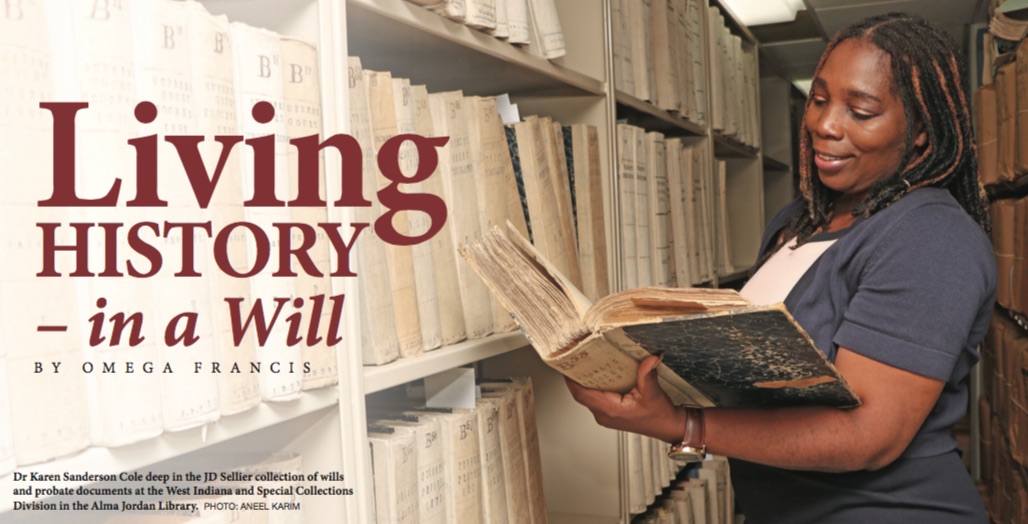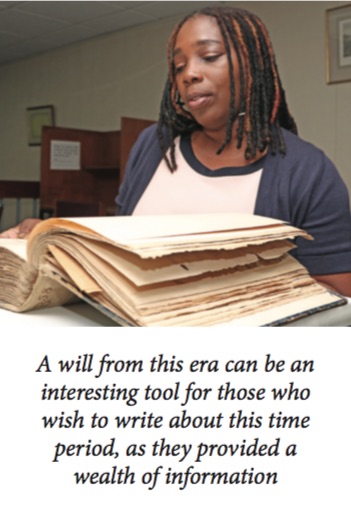
"Enough drama to rival Downton Abbey", so says Dr Karen Sanderson Cole, Lecturer in the Academic Literacies Programme at the Modern Languages and Linguistics Department, about a collection of wills and probate documents given to the Alma Jordan Library (AJL).
The documents were offered and delivered to the AJL in 2013 by JD Sellier and Company when, having no further use for them, a member of the firm suggested they could be of value to the West Indiana and Special Collections (WISC) Division at the AJL. There was little hesitation on the library’s part in accepting this collection—which spans from the 1860s to the 1960s—from the oldest law firm still in operation.
"Of course we recognised the importance and potential of the collection," says Dr Glenroy Taitt, Head of WISC, "not just for persons who may have a legal background, but really it has an interest that transcends disciplines." Now, the average person may not understand how a last will and testament could reveal anything as engaging as what occurs on a British historical period drama, but Dr Sanderson Cole has managed to delve into the collection and retrieve the historical and literary gems held within the legal papers. She revealed her findings at a lecture entitled 'Researching Wills' held on September 26 at the AJL's Audio Visual Room.
The event was part of a series of lectures and seminars usually held once a semester by the WISC. “The idea is always to bring to persons’ attention the collections that we have and encouraging people – both within the university and independent researchers – to use the material," says Dr Taitt.
'Researching Wills' was also part of a very special remembrance for the AJL. "This event is one of a series of events we are using to commemorate our anniversary," says Deputy Campus Librarian Ms Allison Dolland. "The AJL building will be 50-years-old."
It was an exciting task for Dr Sanderson Cole to peruse the huge collection of bound volumes, and what she uncovered was what she termed, “narratives of our country.” The documents surrounding the production and probate of a will, as well as the will itself, reveals much of the writer of said will—maybe a bit more to one with a literary mind, however. Some of us may be familiar with novels that have utilised wills as the basis for their plot, such as Henry James’ The Portrait of a Lady, which is a prime example of how literature can use wills and conveyance to drive a story.

Of course, when viewing these documents from a literary standpoint one can see the personality of the writers and the relationships they held with their family members. Many used their will as a way to exact their last bit of control over their family (in the case of the man who bequeathed his wife to his son); to get revenge (in the case of the man who left his legal wife a shilling, “to spend as she sees fit,” but left the “rumoured wife” or mistress, all his worldly possessions); or to showcase the power of the church (in the case of the spinster who willed her property to her friend on the condition that the friend say 25 masses for her soul). What happens after the will has been probated tends to be where the drama occurs.
The investigation of the collection by Dr Sanderson Cole also revealed broad truths about the society. She said she was struck by the number of persons who held mortgages and life insurance policies in and around the Port of Spain area. Their wills pulled back the curtain of what life was like in Trinidad and Tobago in the early 20th Century. Many of the urbanised areas throughout our capital city were residential areas then. The wills of prominent (and not so prominent) families charted how property and possessions changed hands and the relationships between family members.
From the 1870s to early 20th Century, the wills documented another historical nugget: the value of cocoa and coconuts. The itemisation and calculation of these plants’ value was precise and unwavering, down to the last shilling. These were expensive crops and land where they were cultivated held value.
A will from this era can be an interesting tool for those who wish to write about this time period, as they provided a wealth of information on household possessions, the materials houses were built from, as well as the number of rooms, types of rooms, and even the orientation of the kitchen compared to the main house. This precise documentation was necessary to reveal the wealth and value of possessions but can also be used as a historical document on which one can base fictional narratives.
Whether you are a researcher of history, literature or any other field related to society and culture, you will soon be able to access this collection of documents. The staff at the AJL is currently working on creating a database of this trove of history and literature.